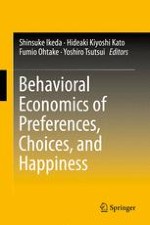2016 | OriginalPaper | Buchkapitel
20. Subjective Random Discounting and Intertemporal Choice
verfasst von : Youichiro Higashi, Kazuya Hyogo, Norio Takeoka
Erschienen in: Behavioral Economics of Preferences, Choices, and Happiness
Verlag: Springer Japan
Aktivieren Sie unsere intelligente Suche, um passende Fachinhalte oder Patente zu finden.
Wählen Sie Textabschnitte aus um mit Künstlicher Intelligenz passenden Patente zu finden. powered by
Markieren Sie Textabschnitte, um KI-gestützt weitere passende Inhalte zu finden. powered by
